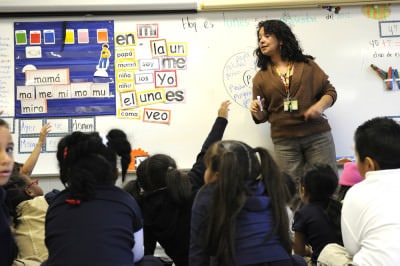

One of the most frequent refrains in public education is to “do what’s in the best interest of the children.” This phrase is probably said once a day at school board meetings across the country. A follow-up question, however, receives far less attention: To what extent do we care about students’ interests?


I was thinking about all this a couple weeks ago when Charlotte-Mecklenburg Board of Education member Ericka Ellis-Stewart floated the idea of a student representative on the school board. As The Charlotte Observer reported, she brought up the idea at the board’s policy committee meeting a few weeks ago, calling it “an innovative way to say that we really care about what our students have to say.”
She said Montgomery County, Md. allows a junior or senior in high school to serve a one-year term on the school board, voting on everything except budgets, boundary changes, and school closings, or personnel matters.
Ellis-Stewart’s idea is fraught with challenges. First, CMS would need permission from the General Assembly to allow a student to serve on the school board.
But there are philosophical questions, too.
Should a high school student be at a three-hour school board meeting on a Tuesday night before a chemistry exam on Wednesday? Would a student — even a highly intelligent one — be able to sort through the piles of information presented on complicated policy issues?
Could a 17-year-old handle the intensity and gamesmanship that come along with serving on a public body?
Could a student be able to handle the politics of being a school board member? As students in Kentucky recently discovered, politics is messy. They were attempting to pass a bill in the state legislature allowing students to sit on panels that select schools superintendents. The bill was popular — so much so, in fact, that lawmakers started attaching controversial riders to the proposal, putting the students in the awkward position of trying to kill their own bill.
“I took AP government a couple of years ago and definitely did not learn about this side of politics,” one student told the Associated Press. Could a 17-year-old handle the intensity and gamesmanship that come along with serving on a public body?
These are all real concerns — but they have to do with tactics, not the larger goal. Policymakers should heed Ellis-Stewart’s advice and pay more attention to the student voice.
MeckEd, my employer, held a community conversation last fall featuring five Charlotte-Mecklenburg Schools high schoolers. They were all part of GenerationNation, a program that engages students in the civic process. It would be safe to say that most people in the audience were surprised at the students’ knowledge and poise on policy issues. Not only did they know what was going on, but they had an opinion about it.
Teachers know this, of course, because they see it every day. But for members of the public, particularly people who don’t have children or those who believe their kids are somehow outliers from their peers, it was enlightening.
Ellis-Stewart’s proposal offers CMS an opportunity to innovate, possibly becoming a national leader in how it engages students in policy decisions.
Ellis-Stewart’s proposal offers CMS an opportunity to innovate, possibly becoming a national leader in how it engages students in policy decisions. This is not the most important issue the school board will tackle this year, but it is a worthy endeavor.
When I was in high school in CMS, I briefly served on a district-wide student council panel. Each high school’s Student Government Association sent one delegate to the district group, which met once a month. We debated meaningful policy issues (a student assignment proposal, I think, although it’s been 15 years) and less-weighty-but-important-to-our-constituents topics like relaxing CMS’ longtime opposition to school dances.
Perhaps we were too idealistic, but we believed someone would listen to our concerns and opinions, even if they did nothing else. Students will be more invested in their schooling if they feel education is not something being done to them, but rather something in which they are a partner. That means input in policy decisions — from a seat on the dais or a seat in a classroom.


